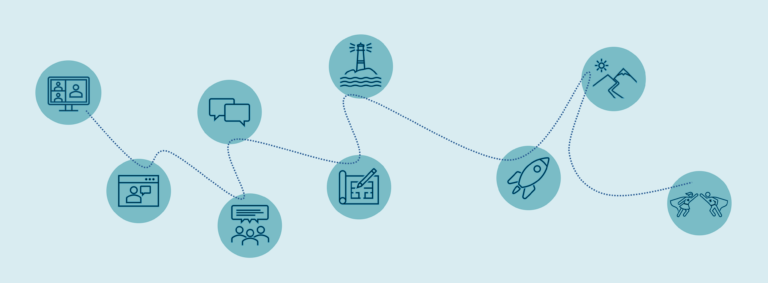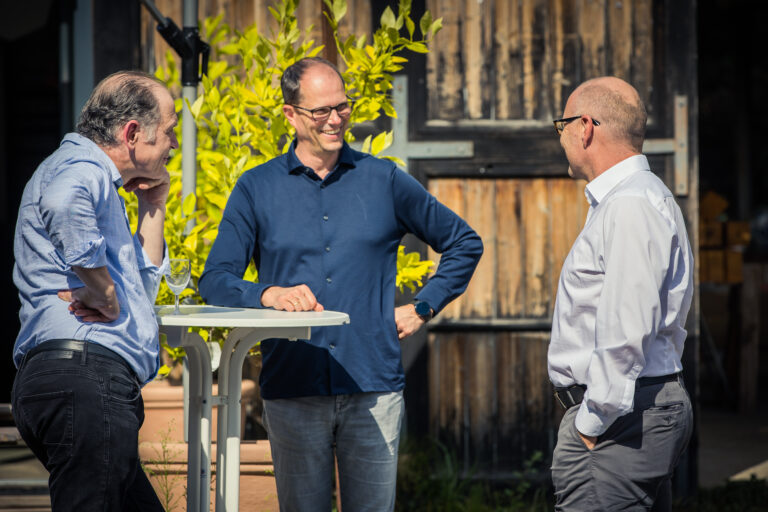A guest contribution by Roswitha A. van der Markt
… whatever the headline for the “new” skills, prerequisites, challenges or competencies of a management team, the ability to change is consistently cited as a fundamental characteristic. Leaders are needed to show our society and our companies the way into the new world of digitalization. But where do we stand today in this evolution towards agility, new work and collaboration on the one hand, and innovation, digitalization and artificial intelligence on the other?
Some companies have actually gone ahead, Haufe and Bosch for example, who have developed this modularly from within themselves. Who were able to mobilize so-called “rebels” both among the management and among the employees, the nowadays so-called “grassroots”. Only in this way can change succeed sustainably in a company. With courageous “rebels” as sponsors of the new movement at the top, who also prove again and again that the new path towards openness, appreciation, collaboration is really desired. Those who question themselves, lead the way as role models and constantly reaffirm the meaning and purpose of such change, are themselves open to doubt and error, and thus embark on the path to a new culture. With this courage and willingness to change, this management team creates the space in which the grassroots, with their teamwork and collaboration across silo, country and company boundaries, can create not only “new work” and innovation, but also a new culture. It needs “rebels” from above and below who encourage each other in their efforts. Courage and trust– are the decisive qualities for New Work, New Leadership and Innovation to really make the breakthrough. After all, according to the 2018 Innovation Rankings of the Boston Consulting Group (BCG), corporate structure and culture are the central sources of innovation. Because only in a culture of trust, courage to new ideas and a diversity of perspectives can arise.
“Innovate or Die”
Therefore, we are still miles away from a breakthrough. Despite good examples, despite countless excellent articles, lectures and contributions. German companies do not fare particularly well in the BCG Innovation Ranking 2018. None of the top 20 most innovative companies is listed, although BASF, Bayer, BMW and Daimler were at least mentioned in the previous year. The success motto “Innovate or Die” does not seem to be important enough to German companies, especially since the pressure to innovate can only be met with new structures, new competencies and, above all, dialog and collaboration. Limiting innovation to a mere introduction of digital technologies is the biggest mistake managers can make today. A little qualification and the introduction of new methods is no longer enough to keep up with the innovative power from the USA and China. “New thinking” is what the country needs, but our government is showing the way: It would rather hold on to posts and power than worry about meaning and purpose for a Germany fit for the future.
New Work as a playground
The challenge of digital transformation lies in collegial and servant leadership that is not based on hierarchy, power, status and ego, but on collaboration in a community. A digital leader sees himself as an enabler, coaches at eye level, motivates and inspires, and is also prepared to integrate himself into teams and not act as a boss. A leader who can build a culture of trust, where mistakes are seen as opportunities and openness of thought and clear “speaking up” is encouraged. It is therefore no surprise that Siemens launched such a change program globally in 2016, away from the “Organizational Silence” that has been identified as the biggest barrier to organizational development and transformation (Robert Hardt, President [&] CEO Siemens Canada Feb. 17, 2016)
In my opinion, many companies have just cleared the space for “playgrounds” at the moment. They are testing what might work. In an economically prosperous time, especially for German companies, you allow yourself that. However, one hardly sees any really new organizational forms, at best flatter hierarchies and a larger number of teams that can try out new methods of agility, from design thinking to Scrum. A familiar trait for Germany: wait and see what will prove itself in the future. But then the future has long since raced past us, in any case the USA like China. After all, the next challenge of artificial intelligence is already waiting in the wings. What are we actually waiting for now? – and for how long?
Innovation labs and organizational ambidexterity are seen as the new path to salvation in an innovative, fast-paced and uncertain VUCA business world, because the previous “old”, traditional way of working, the earning power of the core businesses, thus the cash cow, remains intact for the time being, but is supplemented with an agile “start-up” tip, in which the “new” can now be tested. Few, however, really have a disruptive goal in mind. Gisbert Rühl is worth mentioning here: from the old steel trade to an open platform in which his competitors are also integrated. And an academy where all employees can undergo digital training and development. Overall, however, there is still a lack of examples of disruptive business models and modern forms of organization. But can innovation really work for a company in the long term in an “encapsulated” lab or start-up? How do the 80 percent of cash cows that bring in the earnings demanded per quarter on the stock market feel about the 20 percent of “modern” salvationists? Shouldn’t innovation be strived for as a result of the entire organization and an end-to-end culture change? Can such a new two-tier system lead to sustainable success?
Stagnation in the digital mindset
What does it take to achieve Next Leadership and Agility? – was the fundamental question of the workshop: Next Leadership at the NextAct event on September 18, 2017 in Cologne. The executives surveyed in the 2017 Strametz Next Leader Study disappointed with their
Top 5 requirements for managers in the next 5 years
- Flexibility and willingness to change
- Dealing with new forms of organization/ less hierarchy
- Dealing with diversity and individualization
- Value-based corporate management
- Communication.
Entrepreneurs seem to have slept through the last 10 or even 25 years. Communication as a perennial issue, mostly still as a top-down one-way channel. Anyone who has not yet understood that it is about dialog and transparency, about personal interaction and networking, has not yet understood the possibilities of social media in the company. Value-based management – a discussion that has been going on for around 10 years, but which should be a fundamental basis even for traditionally managed companies.
Willingness to change is not enough
As early as 10 years ago, topics such as Purpose, Dignity, Diversity, and Individualization were central to the business discussion among thought leaders. With us apparently only future topics? The calls for less hierarchy and positional power, flexibility and willingness to change are also age-old, and were also cited by the executives in the Strametz study as Priority 1 of today’s management challenges. Change management has been around for 25 years now, as has the call for an end-to-end “learning organization.” If you had to give school grades or issue a qualified report card, the only thing you could say with the best conscience about most of them would be, “made an effort.” Because a willingness to change is not enough. After all these years, there should be a deep as well as broad change competence in the management. This requires the will to change, above all action/implementation. So it’s no wonder that companies in Silicon Valley are quite a bit further ahead.
Company Purpose – What really makes sense?
German companies love to wait and see, to play it safe, to analyze and discuss what might be viable for the future instead of really taking a new company-specific path and trying it out. Prototyping not only for products, but also for organizational forms. Company-specific, of course. After all, what good is a consensus definition of modern leadership behavior if it does not fit one’s own company? “One size fits all” leadership guidelines that we can all safely cling to can no longer exist either, but rather very specific corporate cultures.
The basis for this, however, is to really know the meaning and purpose of one’s company as a leader, with enthusiasm and vision on the one hand, and with a fundamental understanding of the people and thus the basic culture in the company on the other. But this seems to be lacking, despite all the vision statements, guiding principles and corporate values that are mostly just smoke and mirrors.
Instead of analytically asking which leadership approaches will gain in importance in the future, whether cybernetics, self-organization, democracy or visionary, the challenge is first to clarify: What makes sense? What fits the company? Where does the organization stand, what is our culture like? What creates benefit and value for the future? – then perhaps one would also come up with sensibly disruptive business ideas.
Thus, however, many companies are increasingly unsettled and continue to focus on increasing efficiency, albeit with the help of digital technologies. For me, this is a clear indication of the lack of self-confidence as an entrepreneur and manager – in the necessary digitization, in the real disruption of business models. Above all, however, in a “new” development of management thinking, towards more trust in employees, in people instead of in old familiar financial key figures, data, facts and technological efficiency enhancement.
“German Economy in Digi-Valley”
Although the euro is strong and the German economy is booming, it is not in the world of digitization: “Digitization has arrived everywhere – just not on the balance sheets of German corporations,” says Frank Riemensperger, Chairman Accenture Germany (Jan. 11, 2018). The current Accenture study
“Germany’s Top500: Digital Business Models without Business” puts its finger on the open wound: Unfortunately, the annual reports of Germany’s Top500 companies hardly contain any noteworthy revenues from new digital business models. Rather, digital technologies served primarily to increase efficiency. “Growth and operating margins in core German industries such as automotive, machinery/plant engineering and retail are declining, while competitors from the USA and China are pulling away with superior digitization models. The dwindling strength of the major German corporations can no longer be overlooked. German industry urgently needs fresh growth prospects to keep pace with future topics such as artificial intelligence or quantum computing.”
However, disruptive business models require an understanding of people, first and foremost the power of the individual customer as well as the individual employee. We Germans can do little with that. We strive for security, the greatest possible security, and thus lose sight of the fact that this can no longer exist in a VUCA world, that exact planning and budgeting are hardly possible in a complex world. Therefore, Niels Pfläging also advises “to forgo budgets and planning and instead prepare for the future.”
That’s the tricky thing about flexibility and willingness to change. Both are fundamentally uncertain terrain. Therefore, previous change management programs were assigned clear financial measurement criteria and time milestones, usually “pulled through” like a project, and often branded as failed if these goals were not met. However, not useful for fundamental culture change. Felix Hieronymi, Corporate Project Leader – Agile Transformation Bosch, speaks from the heart when he states that although the transformation project “Enabling Enterprise 2.0/ Agile Company in the digital age” has officially been completed after 5 years, the transformation naturally continues. One of his key learnings is that enabling change is a fundamental business competency and just doesn’t fit into a project setup. However, this is precisely what is lacking: change competence, the will to change, and the acceptance that new things must always be recognized, adapted, and integrated in transformations.
“Old” versus “New” Change Management
Nevertheless, we have sufficient experience and know-how in the change management that is so necessary. However, with wrong measurement criteria and initial as well as expected scenarios, change meant enormous effort, additional resources and energy, with uncertain and mostly unpredictable outcome. It’s an equation that often didn’t add up. So it’s no surprise that the flexibility and willingness to change of German managers is not very high.
The old assumptions are still haunting people’s minds that individuals are very reluctant to change, that they need a “burning platform”, i.e. that they are only ready to change when they are afraid, that a lot of resistance is to be expected. Although we know the “Valley of Dispair” and thus scenarios, which ups [&] downs can happen in a change process, even how to better deal with them, what is not known is the measurable, certain result of success.
This is where the trap of the need for security strikes in two forms for managers. Why would they initiate a change, with uncertain outcome for their own personal development and positioning. Should you really give up power and status, make yourself obsolete? What follows after that? If we look at the status quo, we need much more change for the managerial ranks than for the employees. However, executives should have long recognized their situation as a “burning platform,” apparently preferring blinders and thus reinforcing the old prejudice.
We humans are not fundamentally afraid of or resistant to change, but strive for it when it makes sense to us, creates new opportunities and experiences, or is simply fun. According to neurobiological findings, changes should be associated with pleasant expectations and experiences, thus by no means signifying a “away from”, but much more a “towards”. But how can we make modern leadership palatable to the “old” leadership so that they can see that they can gain more freedom for themselves, more togetherness, more community, new insights and experiences. How can we ensure that managers no longer underestimate their employees and colleagues at precisely this point and trust them with transparency, self-organization and a sense of responsibility? Because only with an agile, self-responsible, open and networked way of thinking and working can we master the complex market requirements and shape a human-centric economy with artificial intelligence.
Artificial intelligence – a far greater challenge
Considering that the use of artificial intelligence will increase the growth of companies by 38 percent as early as 2022 and create completely new types of jobs in which people and intelligent machines will work together as a team, the focus on people in the company in particular is imperative. From September to November 2017, Accenture surveyed 14,078 employees and self-employed individuals and 1,201 executives at companies in 11 countries worldwide. Two-thirds of top executives surveyed (72 percent) believe that the adoption of smart technologies is critical to their organization’s ability to differentiate itself competitively. 42 percent believe that any innovation in the future will be based on artificial intelligence, and 61 percent want to automate more tasks and processes on a large scale in the next three years.
But employees and freelancers also have confidence in the transformation of the working world and the use of smart technologies. More than half (61 percent) expect positive effects on their daily work and new opportunities. “Artificial intelligence has the potential to further boost growth and employment, especially in industrialized countries. But companies will only benefit if they use technology in a way that enables their employees to take on new tasks,” says Thomas D. Meyer, Country Managing Director of Accenture Switzerland.
Surprisingly, companies in this country have so far shied away from making major investments in preparing their employees for this working world. Only about 3 percent are planning significant additional spending on training in the next three years in order to be able to use the full potential of smart technologies in everyday working life, as well as to reduce fears and reservations. (Study: Reworking the Revolution: Are you ready to compete as intelligent technology meets human ingenuity to create the future workforce?’)
But “training” in the old sense is not enough. What is missed today in terms of modern working methods, collaboration, self-organization, ability to change, dealing with complexity and flexibility, and new leadership thinking cannot be made up for.
Employees who do not want to wait for their managers to be willing to change and who want to take their development, networking and collaboration into their own hands will find a sensible alternative in WOL “Working out Loud” by John Stepper: “Those who get started with it very quickly realize that it makes them increasingly independent and that the sometimes desperate dependence on hierarchy gives way to a newfound courage that enables individuals to position themselves against irrational and meaningless leadership behavior,” cites Sabine Kluge (Kluge Consulting, Linkedin 27.11.2017)
Companies and management would therefore do well to allow the playgrounds that have now been granted to actually function as development fields for New Work and New Leadership, open to the most diverse results. For Niels Pfläging puts it aptly: “Change is like putting milk in coffee”. Change, even in the smallest push, is permanent and there is no way back.
But what will happen when the German economy is no longer doing so well? Will the test labs then be closed again and the “human” guinea pigs dutifully ordered back into the hierarchy, because in times of crisis, people too often fall back on the tried and true?
When Europe no longer plays an economic role, or hardly at all, and companies realize too late that they are insufficiently prepared for the integration and collaboration with Artificial Intelligence, because we have missed that digital technologies represent a real revolution that requires people with creativity, innovation and deep social understanding and values. This is when the power of the independence of individuals proves itself, an independence and ability to self-organize that causes many to leave the traditional companies and continue to live out this independent and networked work and shape the future.
About the author:
Roswitha A. van der Markt
Garngartenstr. 6
85241 Hebertshausen
Please also visit our blog for exciting articles on the topic of Next Leadership.










